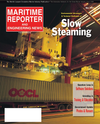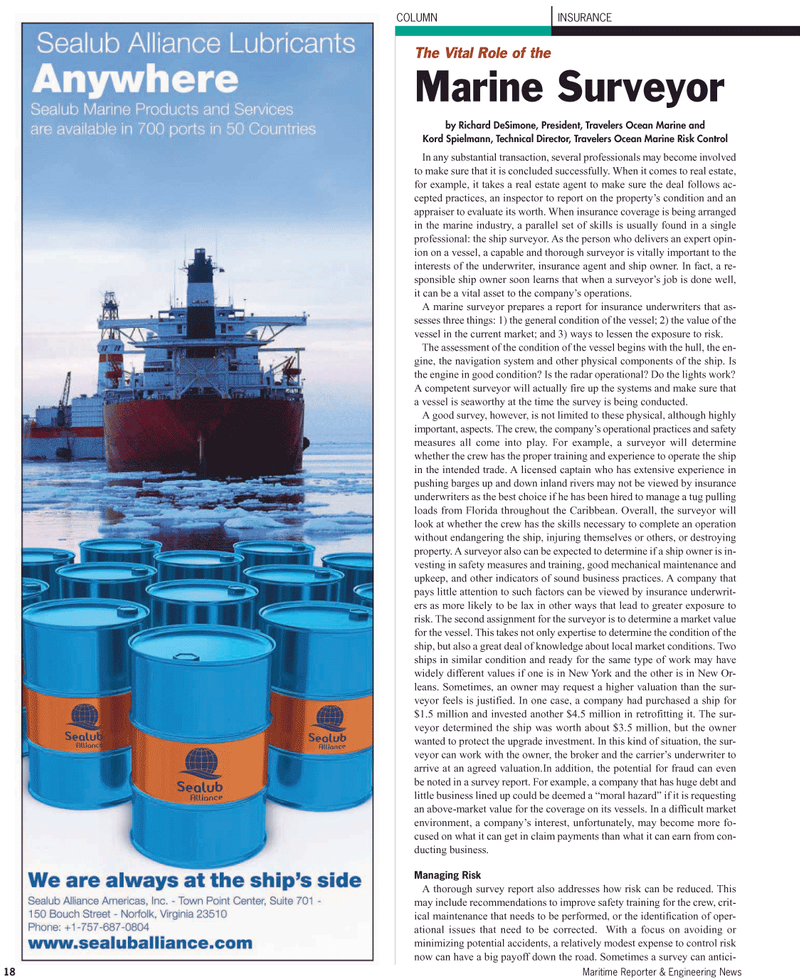
Page 18: of Maritime Reporter Magazine (May 2, 2010)
Read this page in Pdf, Flash or Html5 edition of May 2, 2010 Maritime Reporter Magazine
In any substantial transaction, several professionals may become involved to make sure that it is concluded successfully. When it comes to real estate, for example, it takes a real estate agent to make sure the deal follows ac- cepted practices, an inspector to report on the property’s condition and an appraiser to evaluate its worth. When insurance coverage is being arranged in the marine industry, a parallel set of skills is usually found in a single professional: the ship surveyor. As the person who delivers an expert opin- ion on a vessel, a capable and thorough surveyor is vitally important to the interests of the underwriter, insurance agent and ship owner. In fact, a re- sponsible ship owner soon learns that when a surveyor’s job is done well, it can be a vital asset to the company’s operations.
A marine surveyor prepares a report for insurance underwriters that as- sesses three things: 1) the general condition of the vessel; 2) the value of the vessel in the current market; and 3) ways to lessen the exposure to risk.
The assessment of the condition of the vessel begins with the hull, the en- gine, the navigation system and other physical components of the ship. Is the engine in good condition? Is the radar operational? Do the lights work?
A competent surveyor will actually fire up the systems and make sure that a vessel is seaworthy at the time the survey is being conducted.
A good survey, however, is not limited to these physical, although highly important, aspects. The crew, the company’s operational practices and safety measures all come into play. For example, a surveyor will determine whether the crew has the proper training and experience to operate the ship in the intended trade. A licensed captain who has extensive experience in pushing barges up and down inland rivers may not be viewed by insurance underwriters as the best choice if he has been hired to manage a tug pulling loads from Florida throughout the Caribbean. Overall, the surveyor will look at whether the crew has the skills necessary to complete an operation without endangering the ship, injuring themselves or others, or destroying property. A surveyor also can be expected to determine if a ship owner is in- vesting in safety measures and training, good mechanical maintenance and upkeep, and other indicators of sound business practices. A company that pays little attention to such factors can be viewed by insurance underwrit- ers as more likely to be lax in other ways that lead to greater exposure to risk. The second assignment for the surveyor is to determine a market value for the vessel. This takes not only expertise to determine the condition of the ship, but also a great deal of knowledge about local market conditions. Two ships in similar condition and ready for the same type of work may have widely different values if one is in New York and the other is in New Or- leans. Sometimes, an owner may request a higher valuation than the sur- veyor feels is justified. In one case, a company had purchased a ship for $1.5 million and invested another $4.5 million in retrofitting it. The sur- veyor determined the ship was worth about $3.5 million, but the owner wanted to protect the upgrade investment. In this kind of situation, the sur- veyor can work with the owner, the broker and the carrier’s underwriter to arrive at an agreed valuation.In addition, the potential for fraud can even be noted in a survey report. For example, a company that has huge debt and little business lined up could be deemed a “moral hazard” if it is requesting an above-market value for the coverage on its vessels. In a difficult market environment, a company’s interest, unfortunately, may become more fo- cused on what it can get in claim payments than what it can earn from con- ducting business.
Managing Risk
A thorough survey report also addresses how risk can be reduced. This may include recommendations to improve safety training for the crew, crit- ical maintenance that needs to be performed, or the identification of oper- ational issues that need to be corrected. With a focus on avoiding or minimizing potential accidents, a relatively modest expense to control risk now can have a big payoff down the road. Sometimes a survey can antici- 18 Maritime Reporter & Engineering News
COLUMN INSURANCE
The Vital Role of the
Marine Surveyor by Richard DeSimone, President, Travelers Ocean Marine and
Kord Spielmann, Technical Director, Travelers Ocean Marine Risk Control

 17
17

 19
19
